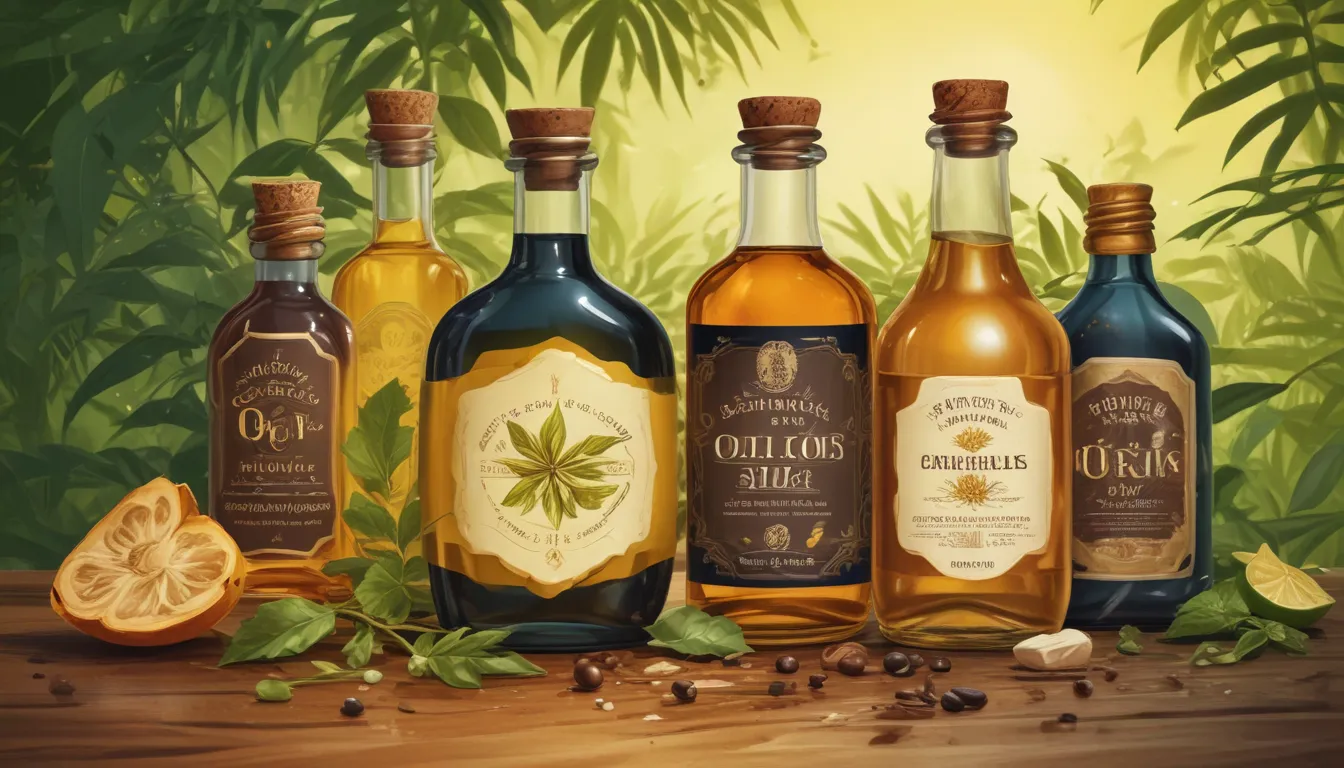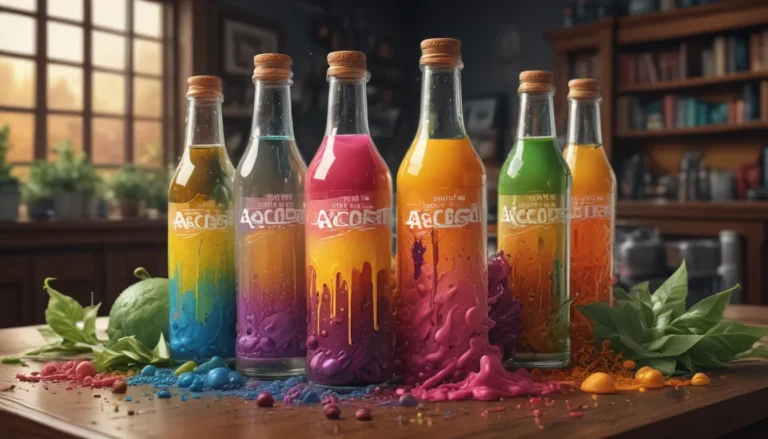A Note About Images: The images used in our articles are for illustration purposes only and may not exactly match the content. They are meant to engage readers, but the text should be relied upon for accurate information.
Are you ready to dive into the captivating world of oils and uncover their fascinating properties, uses, and benefits? From cooking staples to beauty enhancers, oils have a multitude of applications that have shaped various industries for centuries. In this article, we will explore 18 unbelievable facts about oils that will leave you amazed and inspire you to learn more about these versatile substances. Let’s embark on a journey to discover the intriguing chemistry behind different types of oils, their production methods, and their incredible applications in everyday life.
Unveiling the Diversity of Oils
The world of oils is incredibly diverse, with various types available for different purposes. Whether it’s olive oil, coconut oil, or lavender oil, each type possesses unique properties and benefits. Oils have been used for centuries in a multitude of ways, from cooking and preserving food to creating art and providing therapeutic benefits through essential oils.
A Glimpse Into the History of Oils
Since ancient times, oils have played a significant role in cultures around the world. Egyptians used oils for embalming, while Greeks and Romans utilized them for medicinal purposes. Oils have a rich and fascinating history that spans across civilizations, showcasing their importance in various aspects of human life.
The Art of Extracting Oils from Plants
One of the most common methods of obtaining oils is through the extraction process. Plant oils can be obtained using techniques such as cold pressing, steam distillation, or solvent extraction, capturing the essence of the plant in the oil. This process allows for the preservation of the plant’s beneficial properties in the extracted oil.
Harnessing the Therapeutic Benefits of Essential Oils
Essential oils are highly concentrated plant extracts renowned for their therapeutic benefits. Used in aromatherapy, essential oils promote relaxation, aid in sleep, and alleviate certain ailments. Lavender oil, for instance, is valued for its calming properties, highlighting the diverse benefits of essential oils in enhancing overall well-being.
Unraveling the Mystery of Smoke Points
Each type of oil has a specific smoke point, indicating the temperature at which it starts to smoke and break down. Understanding the smoke point of oils is crucial for cooking, as oils with low smoke points are not suitable for high-temperature cooking methods like frying. This knowledge ensures the preservation of the oil’s quality and flavor.
Navigating the Environmental Impact of Oil Spills
Oil spills, whether on land or water, can have devastating consequences on the environment. They pose a threat to marine life, contaminate water sources, and disrupt ecosystems for years to come. Preventing oil spills and implementing effective cleanup measures are essential in protecting our environment and biodiversity.
Embracing the Preservation Qualities of Oils
For centuries, oils have been utilized as a method of food preservation. From pickling vegetables in olive oil to creating oil-based jams, oils help extend the shelf life of perishable items while enhancing the flavors of dishes. The preservation properties of oils showcase their versatility beyond culinary uses.
The Evolution of Oils as Alternative Fuel Sources
Beyond cooking and skincare, some oils such as biodiesel serve as renewable and environmentally friendly fuel sources. Derived from vegetable oils or animal fats, biodiesel offers an alternative to traditional fossil fuels, promoting sustainability and reducing environmental impact.
Reveling in the Beauty Benefits of Oils in Cosmetics
Oils are prominent ingredients in cosmetic products, offering nourishment, hydration, and a luxurious feel to the skin. Popular oils like coconut oil and argan oil are valued in the beauty industry for their moisturizing properties, showcasing the versatility of oils in skincare routines.
Appreciating the Artistic Legacy of Oil Paintings
Oil paintings have captivated art enthusiasts for centuries with their vibrant colors and longevity. Artists use oil-based paints to create masterpieces that withstand the test of time, exemplified by iconic works like Leonardo da Vinci’s “Mona Lisa.” The rich history of oil paintings highlights the enduring appeal of this artistic medium.
Harnessing the Energy Potential of Oils for Fire
Oil’s flammability has made it a vital energy resource throughout history, from lighting lamps to serving as a heat source. The use of oil as a fuel for fire showcases its diverse applications beyond traditional uses, highlighting its significance in various industries and daily life.
Exploring the Medicinal Properties of Oils
Some oils possess medicinal properties that have been utilized in traditional medicine for centuries. Tea tree oil is known for its antiseptic properties, while peppermint oil is valued for relieving headaches and digestive issues. The therapeutic benefits of oils underscore their potential in promoting health and wellness.
Elevating Culinary Experiences with Flavored Cooking Oils
Cooking oils like sesame oil and truffle oil add unique flavors to dishes, enhancing the taste and aroma of culinary creations. Whether used as finishing touches or for sautéing ingredients, flavored cooking oils elevate the gastronomic experience, showcasing the versatility of oils in cooking.
Embracing the Relaxation Benefits of Massage Oils
Massage oils infused with essential oils offer therapeutic benefits, promoting relaxation, relieving muscle tension, and enhancing overall well-being. The combination of oils and gentle massage techniques provides a sensory experience that revitalizes the body and mind, showcasing the holistic benefits of oils in wellness practices.
Embracing the Lubricating Properties of Oils
From machinery to door hinges, oils serve as lubricants to reduce friction and ensure smooth operation. By minimizing wear and tear on mechanical components, oils prolong the lifespan of machinery and equipment, showcasing their essential role in maintenance and performance optimization.
Unveiling the Makeup Removing Power of Oils
Many makeup removers feature oil-based formulas that effectively dissolve and remove makeup without stripping the skin of moisture. Gentle oils like jojoba oil and almond oil provide nourishment while efficiently removing even waterproof cosmetics, showcasing the effectiveness of oils in skincare routines.
Nurturing Hair Health with Enriching Oils
Various oils like argan oil and coconut oil offer numerous benefits for hair health, moisturizing, nourishing, and adding shine to the hair. Widely used in hair care products and treatments, these oils enhance the vitality and beauty of hair, highlighting their role in promoting healthy hair growth and maintenance.
Preserving Wood with Protective Oils
Applying oils to wood surfaces helps protect and maintain the material’s natural beauty. Oils like linseed oil and teak oil penetrate deep into the wood, preventing moisture penetration and preserving the wood’s integrity. The use of protective oils showcases their role in safeguarding and enhancing wooden surfaces.
Conclusion: Embracing the Versatility of Oils
In conclusion, oils are versatile substances that offer a multitude of benefits across various industries and applications. From their historical significance to their modern-day uses, oils play an essential role in everyday life, showcasing their diverse properties and applications. By exploring the enchanting world of oils, we can appreciate their multifaceted nature and unlock their potential to enhance our lives in numerous ways. Next time you reach for an oil-based product or ingredient, remember the remarkable facts that encapsulate the fascinating world of oils.
FAQs: Exploring Common Questions About Oils
Q: What are essential oils?
A: Essential oils are concentrated plant extracts obtained through methods like distillation or cold-pressing, capturing the natural aromatic compounds and medicinal properties of plants for various uses.
Q: Are all oils edible?
A: No, not all oils are edible. While many oils like olive oil and coconut oil are safe for consumption, it’s essential to check the label and ensure that the oil is suitable for ingestion.
Q: Can oils be used for skincare?
A: Yes, oils are commonly used in skincare products for their moisturizing and nourishing properties, benefiting the skin and promoting a healthy complexion.
Q: Are all oils flammable?
A: No, not all oils are flammable. Some oils have high flash points and are less likely to catch fire, while others are highly flammable and require caution when handling.
Q: Can oils go bad?
A: Yes, oils can go bad over time due to exposure to light, heat, and oxygen, leading to rancidity. Storing oils in a cool, dark place can help prolong their shelf life and maintain their quality.
As you delve into the captivating world of oils, remember to explore their diverse uses, properties, and benefits. From culinary delights to skincare essentials, oils offer a wealth of opportunities to enhance your daily routines and enrich your experiences. Embrace the wonder of oils and unlock their full potential to nurture your well-being and elevate your lifestyle. Join us on this journey of discovery and appreciation for the enigmatic world of oils.






